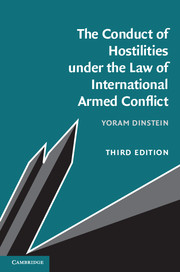Book contents
- Frontmatter
- Contents
- Introduction to the Third Edition
- Preface
- Table of cases
- Table of treaties
- List of abbreviations
- 1 The general framework
- 2 Lawful combatancy
- 3 Prohibited weapons
- 4 Lawful targets of attack
- 5 Protection from attack of civilians and civilian objects
- 6 Measures of special protection from attack
- 7 Protection of the environment
- 8 Specific methods of warfare
- 9 War crimes, orders, command responsibility and defences
- General conclusions
- Index of persons
- Index of subjects
Preface
Published online by Cambridge University Press: 05 April 2016
- Frontmatter
- Contents
- Introduction to the Third Edition
- Preface
- Table of cases
- Table of treaties
- List of abbreviations
- 1 The general framework
- 2 Lawful combatancy
- 3 Prohibited weapons
- 4 Lawful targets of attack
- 5 Protection from attack of civilians and civilian objects
- 6 Measures of special protection from attack
- 7 Protection of the environment
- 8 Specific methods of warfare
- 9 War crimes, orders, command responsibility and defences
- General conclusions
- Index of persons
- Index of subjects
Summary
Once it was believed that when the cannons roar, the laws are silent. Today everybody knows better. In fact, the sheer number of international legal norms governing the conduct of hostilities is phenomenal. Legal themes like proportionality, indiscriminate warfare or the prohibition of mass destruction weapons (to cite just a few prime examples) are bruited about – not necessarily in legal terminology – by statesmen, journalists and lay persons around the globe. The public posture seems to be that, if wars are too important to be left entirely to generals and admirals, so are the laws applicable in war.
The growing public interest in the law of international armed conflict – as much as the increasing desire to see those who breach it criminally prosecuted – attests to a radical change in the Zeitgeist, compared to yester-year. The reasons for the change are immaterial for the present volume. Perhaps the evolution is simply due to the fact that, in the electronic era, the horrors of war can be literally brought home to television screens thousands of miles away from the battlefield. Be it as it may, everybody feels more than ever affected by any armed conflict raging anywhere. By the same token, almost everybody seems to have ideas and suggestions as to how to augment the humanitarian component in the law of international armed conflict. This is a laudable development. But it is important to keep constantly in mind the sobering thought that wars are fought to be won.
Some people, no doubt animated by the noblest humanitarian impulses, would like to see warfare without bloodshed. However, this is an impossible dream. War is not a game of chess. Almost by definition, it entails human losses, suffering and pain, as well as destruction and devastation. As long as war is waged, humanitarian considerations cannot be the sole legal arbiters of the conduct of hostilities. The law of international armed conflict does forbid some means and methods of warfare, with a view to minimizing the losses, the suffering, the pain and the destruction. But it can do so only when there are realistic alternatives to achieving the military goal of victory in the war. Should nothing be theoretically permissible to Belligerent Parties, ultimately everything will be permitted in practice – because the rules will be brushed aside.
- Type
- Chapter
- Information
- Publisher: Cambridge University PressPrint publication year: 2016



